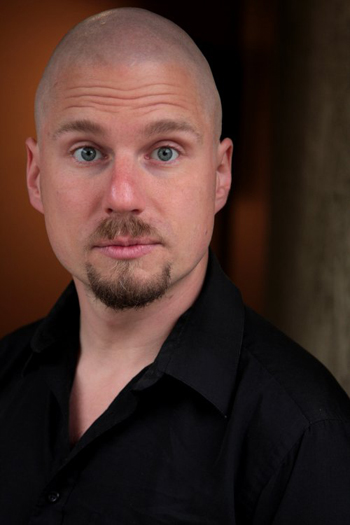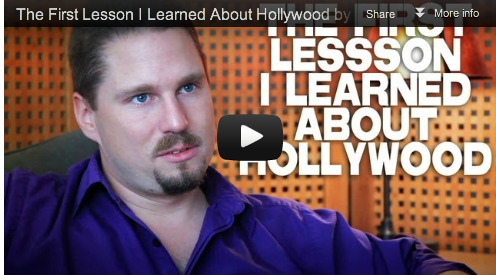
TENNYSON E. STEAD WRITER/DIRECTOR/PRODUCER
“My project has a horror concept… but we’re elevating the genre.”
You’ve heard these words before. Writers, directors, and producers use these words, and when they do it instantly kindles suspicion in the heart of the true genre fan. What these words mean, in essence, is that while you are about to be pitched a horror film, a romantic comedy, a science-fiction story, a fantasy or a romance… this story won’t suck as bad as other stories of the genre tend to suck, and as a result the audience won’t be limited to die-hard fans.
Listen to Tennyson E. Stead tell his ‘Arriving in L.A. story here.’
Trouble is, the person talking this game is often more concerned with roping in the audience they just insulted than they are with telling an amazing story. To earn credibility with the audience in question, a filmmaker often relies on a knowledge of genre convention to convince audiences of their earnestness and legitimacy. “I’m making a space opera, and my film clearly shows that I’ve seen Star Wars. I know the ropes.”
Ok. Fine. You’ve seen Star Wars. At the same time, Star Wars was a genre-defining film specifically because it did not play to expectations, so much as it discovered opportunities for conflict and truth that until the film’s release were considered far beyond the boundaries of space opera. This is what elevating a genre means, and the films that actually accomplish it are counted among the finest or most important in cinema’s history. Frankenstein. A Clockwork Orange. Lord of the Rings. Titanic. The Dark Knight. Eternal Sunshine of the Spotless Mind. 2001: A Space Odyssey. The Shining. The Exorcist. And yes… Star Wars.
Making a film that works on this level is a noble goal, and one I endorse without hesitation or reserve. My own work is firmly grounded in the faith I hold that I, too, am capable of using genre cinema to tell stories that are truly universal and timeless. At the same time, anyone who thinks elevating genre is a question of checking into a set of conventions before getting on with the business of the story is deluding themselves, setting their film up for failure… and they’re pissing off the audience.
My audience! Guys, stop pissing off my audience!
This post is for all the writers, directors, and producers who hope to expand the boundaries of genre – and for the audience, who suffers the consequences of all our misdeeds and mistakes. Herein, I propose to walk you through my inherently deconstructive creative process. Getting to the core of a truly visionary genre story, in the end, is about not telling a genre story at all.
Check out more videos from this interview series
with Tennyson here!
My name is Tennyson E. Stead. I’m a produced screenwriter, an award-winning director, and I have ten years of experience working as a development executive with independent film companies. For those beloved readers who value the craft of storytelling over all else, I will also mention that my background in stagecraft goes back twenty years to the diverse and isolated theater communities of New England. My writing career goes back even farther – as a toddler, I taught myself to write so I could make books for my grandmother about spacemen befriending dinosaurs, and vice versa.
In fact, let’s talk about those stories. Do I think dinosaurs are cool? Obviously. Do I think spacemen are cool? Buddy, I spent the first thirteen years of my life making some very real, very actionable plans to make myself the first man to set foot on Mars. Space Camp. Science scholarships to a prestigious boarding school. Then I discovered physics, which felt a lot like planning my whole life to be a painter only to have someone tell me I was blind.
THEN, I discovered theater.
My point is that I do indeed like spacemen.
But these stories I was writing weren’t about dinosaurs and spacemen. They were about the longing I had to make friends. Genre convention pretty much prohibits dinosaur/spaceman fraternization… but I didn’t care. My spaceman/dinosaur odd couples were determined to overcome their differences.
“So… the point is to not care about genre convention.”
No. Of course not. There are reasons why the classic genre stories are classics. With all that said, understanding what works in genre does not give you the tools to tell a great story. WHY genre conventions work is useless information.
What you need to know is HOW the conventions of a given genre work. Like a watchmaker, you have to take the genre apart… because you’re going to use all those gears and sprockets to make something COMPLETELY different. Making a slasher movie with more jumpscares than Halloween does not make your movie awesome… but introducing a pivotal character with a jump scare made the meeting between Ellen Ripley and “Newt” in Aliens one of the most memorable moments in horror history, and immediately pulled the audience into the blooming relationship between them.
No more homage, guys. We can all assume you’ve seen Star Wars and Halloween by now. If you’re making a horror film, you’ve probably seen quite a few of them yourself… and if you haven’t, I don’t want to watch you pretend that you have.
What I’m saying is this: If you want to define a genre, then don’t show me a movie I’ve already seen. Don’t even show me a moment – NOT ONE MOMENT – that I’ve already seen. NEVER play to the conventions of a genre. At the same time, you cannot afford to ignore them. Instead, take those conventions apart. See what bits and pieces you have to work with. Cherry pick the ones you like, and leave the rest behind. Find characters you love, and take only those qualities most essential to your own, personal relationship with them. Then, give that skeleton a life. Give them a home. Give them objectives that enhance, challenge, and complicate your fascination.
If a particular setting appeals to you, take a moment to figure out what you love most about it… and strip everything else away. What’s left? Is it another world? Are you under the ocean? Is it a feeling, like a sense of isolation – or perhaps an inability to escape? Take that one thing, and look at it with fresh eyes. Ask yourself what kind of story you would like to see play out in that environment, and expand on it with other genre elements that fascinate or delight you – but only the parts that fascinate or delight. Everything else, you can ignore. Mix and match the parts. There are no genre police waiting in the shadows to drag you away. There are no rules you can break.
Actually, that’s not exactly true. There is one rule. Do not suck.
Sometimes, all you need is one little genre sprocket – like the science-fiction element in Eternal Sunshine. Sometimes, you wind up rooting through that box of gears like Leonardo DaVinci on ritalin. What matters is the story you’re telling. The gears are there for when you need them.
Not for when you want them. For when you need them. Avoid convenient choices AT ALL COSTS. Life is rarely convenient, and your story needs to be a lot more interesting than real life.
Don’t try to rebuild the watch. Even if you can, it won’t work as well the second time around. But save the parts. Use them sparingly, and without ceremony – because the parts you don’t use today will wind up helping you with a different story, somewhere down the road. This is the difference between playing TO genre… and playing WITH it.
Keep that box of spare parts handy, and focus on telling a story. Maybe it’s a story about two people – good people – who have irreconcilable differences. And maybe they both need a friend. What could be more simple, beautiful, and human than that? And say… maybe one of them’s a dinosaur!
Buddy, now you’re onto something!
If you’d like to find out more about me, my ensemble, and my stories, we welcome you to our online community at 8sidedforum.com and please, please support our upcoming feature, Quantum Theory. Quantum Theory is the story of two brilliant, goofy, passionate women of science who invent a technological means to alter and shape the very universe itself… until a defense contractor with unlimited resources steals it right out from under them. Their struggle to get it back will literally change the world. You can find out more at here, and at Quantummovie.com.
BIO:
Tennyson E. Stead is a writer, director, and producer of film and transmedia. In his childhood, he spent all his time building cardboard spaceships and rescuing his sister in them. These days he does basically the same thing.
For any production to realize its full creative and financial potential, every creative element must reflect the overall goals of the project. Every great collaborative work was produced by a team of talented people, united by a common intent.
8 Sided Films and the 8 Sided Forum represent our collective stewardship over the stories born from intent too multifaceted, specific, or unique for studio production, and our commitment to honoring that intent as the foundation for a more personal relationship with our audience.
Like Quantum Theory on Facebook!
Check out Tennyson’s prior Film Courage articles:
‘Ten Things They Don’t Teach You About Actors in Film School‘


























